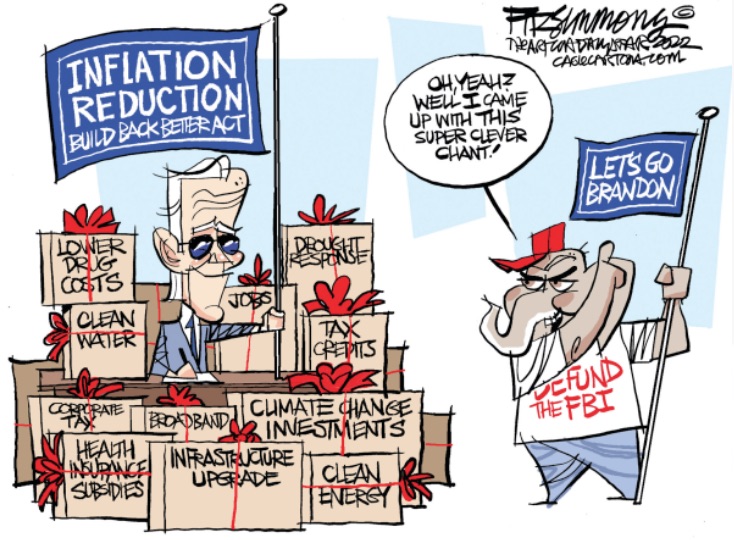Biden Gets Climate Relief for Us All
The First Comprehensive Bill for the U.S.

After a summer of distressing news regarding our nation’s lack of a firm plan to address global heating, Congress was able to pass what is actually the first-ever comprehensive climate bill.
The Senate passed it with no votes to spare. We must thank Senators Manchin and Sinema for their support of this version; their earlier opposition had stalled previous attempts at climate legislation this year. The House followed by passing the bill on August 12, and President Biden signed it right away on the 16th.
Although the climate package falls far short of President Biden’s ambitious Building Back Better legislation, which never moved forward in the Senate, early analysis of the new bill shows that it will get the U.S. to a 40 percent reduction of its greenhouse gas emissions, compared to our 2005 levels, by the end of this decade. President Obama’s commitment to the Paris climate negotiations was a 50 percent reduction by 2030. The new legislation focuses on incentives rather than penalties, carrots over sticks.
This is a really big deal. Were you aware that Congress has until now not passed a single comprehensive climate bill — ever? That’s because the Republican Party has stood united to oppose every single major climate initiative from Presidents Clinton, Obama, and Biden.
About $370 billion will go over 10 years toward $7,500 tax credits for purchasers of electric vehicles — even $4,000 for second-hand electric vehicles — and to nudge utilities to invest in solar and wind power projects.
Europe has vast ocean arrays of wind turbines already in place. The U.K. alone has 40 separate ocean wind farms with nearly 2,300 individual turbines. Currently our nation, with its tens of thousands of miles of windy coastlines, has only a handful. That will soon change. The bill also reverses the previous president’s 10-year moratorium on ocean wind power leases.
Roughly $30 billion is designated for speeding up the manufacture of batteries, solar panels, and wind turbines. Energy storage projects — large scale battery installations are necessary around the country to store solar and wind energy — will see about 30 percent of their costs met by new tax credits. This will help jump start new innovations in energy storage.
Another part of the bill will require fossil-fuel companies to pay steep fees for continuing to emit methane, an extremely potent greenhouse gas, from their oil and gas facilities. These fees could be as high as $1,500 per ton of methane. This is a vital step in reducing our global heating emissions, as methane leaks are generally straightforward to seal.
There is also $27 billion in funding for a brand-new “green bank” through 2024, to invest in climate improvements in disadvantaged communities nationwide.
And there is $500 million to be invested in the manufacture of heat pumps, which are far more climate-friendly appliances for the heating and cooling of homes and businesses.
Different parts of the new bill have important non-climate provisions long-awaited by many citizens and Democrats — Medicare will be able for the first time to begin to negotiate lower drug prices, and health-care subsidies will be extended for three more years.
On the income side of the bill, corporations that report an annual income of over one billion dollars will have to pay a new 15 percent minimum corporate tax. And the IRS, which has for decades now been purposely starved of funding by Republican lawmakers, will see a boost in funding of $80 billion. This is specifically to increase staffing to target wealthy tax cheats and corporations; the IRS has told Congress that “these resources are absolutely not about increasing audit scrutiny on small businesses or middle-income Americans.”



